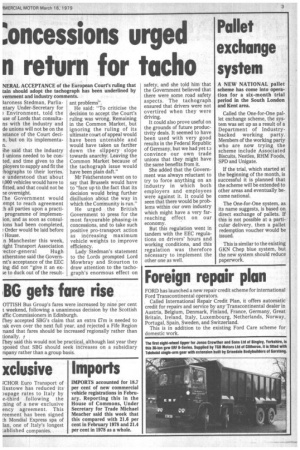:oncessions urged n return for tacho
Page 5

If you've noticed an error in this article please click here to report it so we can fix it.
NERAL ACCEPTANCE of the European Court's ruling that Lain should adopt the tachograph has been underlined by vernment and industry comments.
3aroness Stedman, Parliantary Under-Secretary for Environment, told the use of Lords that consultans with the industry and de unions will not be on the )stance of the Court decin, but on its implementan.
;he said that the industry I unions needed to be conted, and time given to the ployers to supply and fit the :hographs to their lorries. e understood that about 1,000 vehicles would have to fitted, and that could not be :le overnight.
[he Government would empt to reach agreement .h all parties upon a practiprogramme of implemenion, and as soon as consulions had been completed, Order would be laid before House.
n Manchester this week, !ight Transport Association :ector-general Hugh atherstone said the Governmt's acceptance of the EEC ing did not "give it an ex3e to duck out of the result ant problems".
He said: "To criticise the decision to accept the Court's ruling was wrong. Remaining in the Common Market, but ignoring the ruling of its ultimate court of appeal would have been untenable and would have taken us farther down the slippery slope towards anarchy. Leaving the Common Market because of the tachograph issue would have been plain daft."
Mr Fe'atherstone went on to say that Brussels would have to "face up to the fact that its decision would bring further disillusion about the way in which the Community is run."
He urged the British Government to press for the most fav,ourable phasing-in concessions, and to take such positive pro-transport action as increasing maximum vehicle weights to improve efficiency.
Lady Stedman's statement to the Lords prompted Lord Mowbray and Stourton to draw attention to the tachograph's enormous effect on safety, and she told him that the Government believed that there were some road safety aspects. The tachograph ensured that drivers were not overtired when they were driving.
It could also prove useful on the grounds of future productivity deals. It seemed to have been used with very good results in the Federal Republic of Germany, but we had yet t.) convince our own trade unions that they might have the same benefits from it.
She added that the Government was always reluctant to try to force anything on an industry in which both employers and employees were against it. It could be seen that there would be problems within our own industry which might have a very farreaching effect on our economy.
But this regulation went in tandem with the EEC regulations on drivers' hours and working conditions, and this regulation was therefore necessary to implement the other one as well.
























































































































































